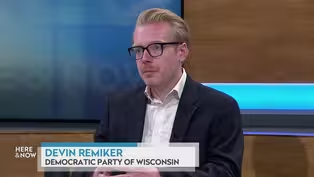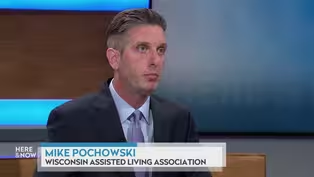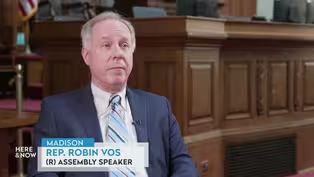Here and Now
Mark Copelovitch on Costs of Tariffs and Wars on the Economy
Clip: Season 2300 Episode 2349 | 5m 23sVideo has Closed Captions
Mark Copelovitch on how tariffs and wars disrupt costs for businesses and consumers.
UW-Madison political science professor Mark Copelovitch considers how an unstable landscape of tariffs and wars disrupts the global economy and everyday costs for American businesses and consumers.
Problems playing video? | Closed Captioning Feedback
Problems playing video? | Closed Captioning Feedback
Here and Now is a local public television program presented by PBS Wisconsin
Here and Now
Mark Copelovitch on Costs of Tariffs and Wars on the Economy
Clip: Season 2300 Episode 2349 | 5m 23sVideo has Closed Captions
UW-Madison political science professor Mark Copelovitch considers how an unstable landscape of tariffs and wars disrupts the global economy and everyday costs for American businesses and consumers.
Problems playing video? | Closed Captioning Feedback
How to Watch Here and Now
Here and Now is available to stream on pbs.org and the free PBS App, available on iPhone, Apple TV, Android TV, Android smartphones, Amazon Fire TV, Amazon Fire Tablet, Roku, Samsung Smart TV, and Vizio.
Providing Support for PBS.org
Learn Moreabout PBS online sponsorshipWisconsin Assisted Living Association, thanks for your time.
>> Tariff threats and trade wars continue.
Israel launches an attack against Iran and the Trump administration signals it may bring the U.S.
Into a war in the Middle East.
There are a lot of developments around the world that are being felt back here in Wisconsin.
And for more on this, we turn to Mark Copelovitch, a professor of political science and public affairs at UW-Madison specializing in international relations and political economy.
Thanks for joining us.
>> Thanks for having me.
>> So we've heard over and over that business loves certainty, but these seem to be very uncertain times.
>> Yes, deeply uncertain times.
>> And what does that mean for business, especially because we're we're interconnected.
Wisconsin is not as isolated as people.
Some people may think it.
>> Is.
Well, it's not just business that hates uncertainty.
It's international relations professors who also hate uncertainty.
So in general, really bad things happen in world politics when there's a lot of uncertainty.
And both on the security side and on the trade policy side, that's what we're seeing right now.
So, you know, on the on the security side, obviously there's what's going on with Israel and Iran and, you know, lack of clarity about what role the US is going to play in that.
But in terms of tariffs and economic policy, the last five months under President Trump has been week after week of uncertainty because of the way, the way the tariff policy is going is an announcement of what's going to happen and then a reversal and then a new announcement and a new reversal.
And, you know, so the way we've the way the US and other countries of the world for decades now, going back to World War Two, have tried to deal with this, is by setting up the World Trade Organization and a bunch of international what country's obligations are both moving towards free trade, but also a lot of tariffs and substitutes for tariffs are legal under these trade agreements.
But the trade agreements create certainty for business and for governments.
And Trump is operating effectively as if none of that exists or the US is not bound by it.
>> So anyone who's had to buy coffee lately, or thinking about a new vehicle knows that prices are rising.
Is there any sense for whether a business or an individual to try and time the market?
Or is it just buy now before prices keep going up?
could imagine I think it's the second one because you can imagine a world and this happened more or less under the Biden administration with we're going to put new tariffs up on China.
And, you know, we're going to keep some of Trump's tariffs.
But more or less, there's the announcement of those policies.
And then you can plan going forward, right.
And both consumers and businesses can kind of make medium and long term purchasing and investment decisions based on that.
What's happening now is we're going to have 10% tariffs on China, know they're going to be 145%.
No, we're going to suspend those.
And in 90 days we're going to negotiate something different.
And you know, there has been talk of we're going to have 90 trade agreements and we don't really have any yet.
So it's hard to time.
The market right now because nobody knows what's going to happen two weeks from now, let alone six months from now, let alone a year from now.
The one thing you can plan for is the baseline now is different, right?
So Trump has invoked the international Emergency Economic Powers Act to put up a baseline 10% tariff on everybody in the world.
Some higher tariffs on Mexico and Canada and China.
So the one thing we all know is some things are now more expensive, right.
But there's a lot of uncertainty now about is that 15% or 150% going going forward.
>> We've heard a lot about trade with China being impacted by tariffs, especially in agriculture.
But your specialty is the European Union.
Can we find new markets there.
Does anyone want Wisconsin's soybeans?
>> Yeah.
It's hard to shift things completely.
I mean, a lot of things, you know, as I talk to my students and talk about the global economy, a lot of things are just structural, right?
That countries specialize in producing different things in the US and China, Europe or the three largest economies in the world.
And a lot of the trade flow patterns and why we have a deficit in some things and a surplus in other things is just kind of structurally where the US and the European Union and China fit in the global economy.
So it's hard to reallocate what we would sell to China or what we buy from China to the EU, because Europe doesn't buy and sell exactly, exactly the same things.
And the Canadians are wrestling with this, too.
Now, if we're going to have a trade war with Canada, and Canada is talking about, we're going to reallocate our economic relationships away from the US, which has historically been 70% of our trading relationship.
And now we're going to shift that to Europe, or we're going to shift that to other countries.
It's hard to do that at all.
And it's very hard to do that quickly.
Right.
So you can imagine if we're in this new world where these types of trade policies become the new permanent over the next 5 or 10 years, then, yes, structurally, things will shift.
But in the short term, it's the uncertainty.
Nobody's going to want to invest in building transatlantic trade that used to go to China.
If it's going to get reversed because of new tariff policies in the next six months or the next three years.
years.
Devin Remiker on Charting Wisconsin Democrats Into 2026
Video has Closed Captions
Clip: S2300 Ep2349 | 7m 7s | Devin Remiker on Wisconsin Democratic candidates and supporters going into the 2026 cycle. (7m 7s)
Here & Now opening for June 20, 2025
Video has Closed Captions
Clip: S2300 Ep2349 | 56s | The introduction to the June 20, 2025 episode of Here & Now. (56s)
Mike Pochowski on Transparency For Assisted Living Referrals
Video has Closed Captions
Clip: S2300 Ep2349 | 5m 11s | Mike Pochowski on financial disclosures from assisted living facility referral agencies. (5m 11s)
Speaker Robin Vos on Wisconsin's 2025-27 State Budget Status
Video has Closed Captions
Clip: S2300 Ep2349 | 7m 38s | Robin Vos on priorities for the 2025-27 Wisconsin state budget as negotiations continue. (7m 38s)
Providing Support for PBS.org
Learn Moreabout PBS online sponsorship
- News and Public Affairs

Top journalists deliver compelling original analysis of the hour's headlines.

- News and Public Affairs

FRONTLINE is investigative journalism that questions, explains and changes our world.












Support for PBS provided by:
Here and Now is a local public television program presented by PBS Wisconsin



